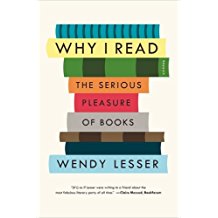Why I Read: The Serious Pleasure of Books, Wendy Lesser, 2014
This is a very good book. Lesser, a writer, editor, and literary critic is quirky, frank, and deeply committed to increasing her wisdom and understanding of the world through literature, an area which she defines quite broadly to include mysteries and science fiction in addition to novels, poetry, and essays. In chapters titled for the elements of the books she loves (character and plot, the space between, novelty, authority, grandeur and intimacy, elsewhere ( a fine chapter on translation), and inconclusions) she explores the elements of great writing and the major impetus for her reading—-pleasure, “the sense of connection with something other than oneself and one’s friends and one’s life in this time.” She provides a litmus test for her judgment about a literary work as follows: “Part of what I am listening for is a voice that convinces me from the start. It is a voice that comes into being on the very first page, as I am entering the world of the literary work, and it must inspire enough confidence in me, right there at the beginning, so that I am willing to depend on it to carry me through whatever we are about to experience together.” Isn’t that just marvelous! She draws heavily on her favorites—Cervantes, Chaucer, Shakespeare, Swift, Dickinson, Hopkins, Henry James, Dostoevsky, Conrad, Lawrence, Dickens, and more recently, Mailer, Bolano, Mantel, and also on some obscure foreign writers none of which I had heard of—-Eca de Queiros, Javier Marias, I was delighted in some shared enthusiasms–Robert Frost’s The Pasture, Thornton Wilder’s Our Town, Louise Gluck’s A Village Life, Fitzgerald’s Blue Flower, The Hare with the Amber Eyes, Jay Rubin and Murakami, and Sebald, Sebald, Sebald. She concludes that the writer’s greatest responsibility is to tell the truth while maintaining the element of doubt. “The work speaks to you or it does not. That is all you can finally say.” Wise words. She also talks about how she reads: “I read for meaning, for sound, for voice—but also for something I might call attentiveness to reality, or respect for the world outside oneself.” She finishes up this fine book with an epilogue about the future of the physical book and a list of 100 books to ‘read for pleasure.” It’s a very quirky list with lesser known works by most of the 100 authors. I’ve read only 16 of them, so there is much to do going forward. A delightful and wise book, similar in many ways to Bloom’s book of 10 years ago, but much more humanly engaging.



